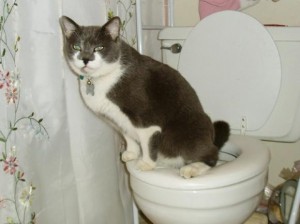Potential Issues of Flushing Cat Poop Down Your Toilet - Safeguard Your Plumbing
Potential Issues of Flushing Cat Poop Down Your Toilet - Safeguard Your Plumbing
Blog Article
We've stumbled upon the article involving Can You Flush Cat Poop Down The Toilet? down the page on the internet and thought it made sense to discuss it with you on this page.

Intro
As cat proprietors, it's important to be mindful of exactly how we dispose of our feline good friends' waste. While it may appear convenient to flush pet cat poop down the toilet, this technique can have harmful consequences for both the setting and human health.
Ecological Impact
Purging cat poop presents dangerous virus and bloodsuckers right into the water supply, posing a considerable danger to aquatic ecological communities. These impurities can negatively impact aquatic life and compromise water quality.
Health Risks
Along with ecological issues, flushing feline waste can also present wellness threats to human beings. Pet cat feces might consist of Toxoplasma gondii, a bloodsucker that can cause toxoplasmosis-- a potentially extreme disease, specifically for expecting ladies and people with damaged body immune systems.
Alternatives to Flushing
Luckily, there are much safer and a lot more liable methods to get rid of feline poop. Take into consideration the complying with options:
1. Scoop and Dispose in Trash
One of the most common technique of getting rid of pet cat poop is to scoop it right into an eco-friendly bag and toss it in the garbage. Make certain to use a devoted clutter inside story and take care of the waste promptly.
2. Usage Biodegradable Litter
Go with eco-friendly cat clutter made from materials such as corn or wheat. These clutters are environmentally friendly and can be securely taken care of in the trash.
3. Bury in the Yard
If you have a backyard, consider hiding cat waste in an assigned area away from vegetable yards and water sources. Be sure to dig deep enough to stop contamination of groundwater.
4. Mount a Pet Waste Disposal System
Buy a family pet garbage disposal system particularly created for feline waste. These systems make use of enzymes to break down the waste, lowering smell and ecological effect.
Verdict
Liable family pet ownership expands past providing food and sanctuary-- it additionally entails correct waste monitoring. By refraining from flushing pet cat poop down the bathroom and choosing alternative disposal approaches, we can reduce our environmental impact and secure human health and wellness.
Why You Should Never Flush Cat Poop Down the Toilet
A rose by any other name might smell as sweet, but not all poop is created equal. Toilets, and our sewage systems, are designed for human excrement, not animal waste. It might seem like it couldn’t hurt to toss cat feces into the loo, but it’s not a good idea to flush cat poop in the toilet.
First and foremost, assuming your cat uses a litter box, any waste is going to have litter on it. And even the smallest amount of litter can wreak havoc on plumbing.
Over time, small amounts build up, filling up your septic system. Most litter sold today is clumping; it is made from a type of clay that hardens when it gets wet. Ever tried to scrape old clumps from the bottom of a litter box? You know just how cement-hard it can get!
Now imagine just a small clump of that stuck in your pipes. A simple de-clogger like Drano isn’t going to cut it. And that means it’s going to cost you big time to fix it.
Parasitic Contamination
Believe it or not, your healthy kitty may be harboring a nasty parasite. Only cats excrete Toxoplasma in their feces. Yet it rarely causes serious health issues in the cats that are infected. Most people will be fine too if infected. Only pregnant women and people with compromised immune systems are at risk. (If you’ve ever heard how women who are expecting are excused from litter cleaning duty, Toxoplasma is why.)
But other animals may have a problem if infected with the parasite. And human water treatment systems aren’t designed to handle it. As a result, the systems don’t remove the parasite before discharging wastewater into local waterways. Fish, shellfish, and other marine life — otters in particular — are susceptible to toxoplasma. If exposed, most will end up with brain damage and many will die.
Depending on the species of fish, they may end up on someone’s fish hook and, ultimately on someone’s dinner plate. If that someone has a chronic illness, they’re at risk.
Skip the Toilet Training
We know there are folks out there who like to toilet train their cats. And we give them props, it takes a lot of work. But thanks to the toxoplasma, it’s not a good idea.

Hopefully you enjoyed reading our topic on How to Dispose of Cat Poop and Litter Without Plastic Bags. Many thanks for taking time to read through our article. Do you know another individual who is excited about the subject? Take a moment to promote it. Many thanks for taking the time to read it.
Browse Website Report this page